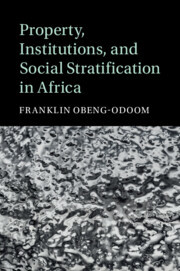Description
Property, Institutions, and Social Stratification in Africa
Cambridge Studies in Stratification Economics: Economics and Social Identity Series
Author: Obeng-Odoom Franklin
Explores and challenges existing conventions of inequality in Africa while offering new insights to explain persistent poverty across the continent.
Language: English
Subject for Property, Institutions, and Social Stratification in Africa:
Approximative price 32.87 €
In Print (Delivery period: 14 days).
Add to cart
Property, Institutions, and Social Stratification in Africa
Publication date: 04-2022
Support: Print on demand
Publication date: 04-2022
Support: Print on demand
Approximative price 120.25 €
In Print (Delivery period: 14 days).
Add to cart
Property, Institutions, and Social Stratification in Africa
Publication date: 03-2020
376 p. · 15.8x23.5 cm · Hardback
Publication date: 03-2020
376 p. · 15.8x23.5 cm · Hardback
Description
/li>Contents
/li>Biography
/li>
In this book, Franklin Obeng-Odoom seeks to carefully explain, engage, and systematically question the existing explanations of inequalities within Africa, and between Africa and the rest of the world using insights from the emerging field of stratification economics. Drawing on multiple sources - including archival and historical material and a wide range of survey data - he develops a distinctive approach that combines key concepts in original institutional economics, such as reasonable value, property, and the distribution of wealth, with other insights into Africa's development and underdevelopment. While looking at the Africa-wide situation, Obeng-Odoom also analyzes the experiences of inequalities within specific countries. Comprehensive and engaging, Property, Institutions, and Social Stratification in Africa is a useful resource for teaching and research on Africa and the Global South.
Preface; Part I. The Problem: Introduction. The Global South in a 'compartmentalised world': 1. The foundations for a new beginning; Part II. Problematic Explanations and Solutions: 2. Property economics; 3. Land reform; 4. Human capital; 5. International trade; 6. Economic growth; Part III. Alternatives: 7. Socialism; 8. Africanisms; Concluding the groundwork for a new political economy of the Global South; Bibliography.
Franklin Obeng-Odoom is Associate Professor of Development Studies at the University of Helsinki, Finland.
© 2024 LAVOISIER S.A.S.




